Gladbeck: The deadly hostage drama where the media crossed a line
- Published
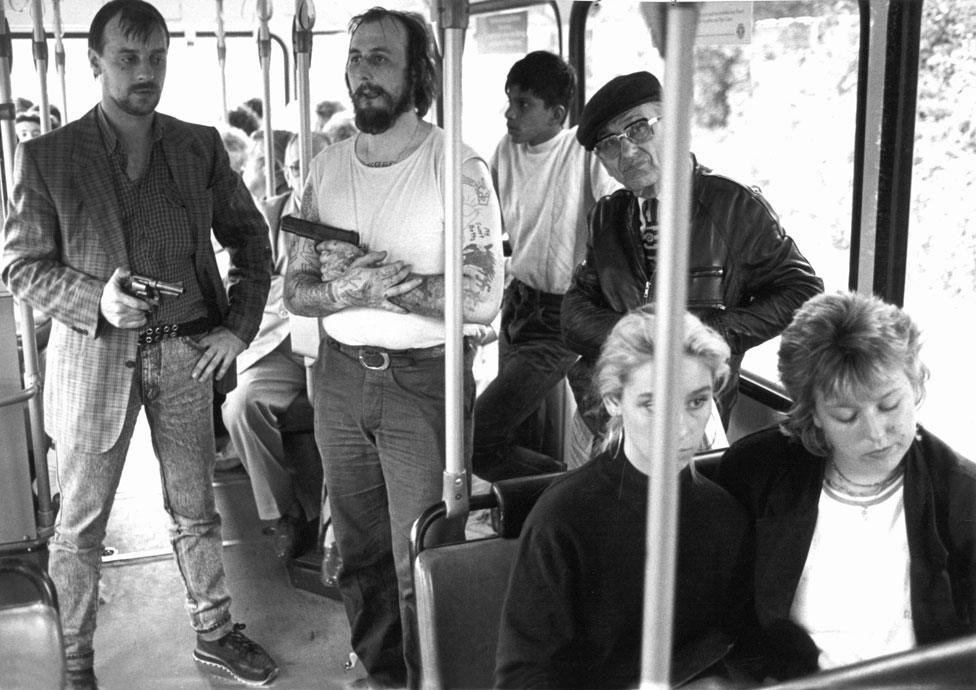
Dieter Degowski (left) with fellow gunman Hans-Jürgen Rösner, and bus hostages
Thirty years ago, West Germany was captivated by a hostage-taking drama that began with a failed armed robbery and ended in a shootout on the autobahn 54 hours later. After the dust had settled the media came in for sustained criticism - and one journalist in particular was thought by many to have crossed a line.
Warning: Some readers will find photographs in this story disturbing
Dieter Degowski was released from prison in February. He'd served nearly 30 years for his part in a series of violent crimes committed in full public view over a period of three days, all eagerly and minutely documented by the media.
The Gladbeck Hostage Drama, as it is remembered in Germany, remains a scar on the nation's consciousness. Because two young hostages lost their lives. Because the police allowed events to escalate out of control. And because the media, finding themselves with extraordinary access to a crime in progress, hampered police attempts to bring it to a peaceful conclusion.
"Gladbeck was a completely new situation for the police and, of course, also a completely new situation for the media," says Udo Röbel, who was then the 39-year-old deputy editor of a Cologne tabloid, the Express.
"If it happened today every journalist would have to stop for a minute and say, 'Hang on, there are boundaries here that I mustn't cross.'
"But back then we were all in a kind of frenzy. We simply didn't stop to consider what we were doing."

Find out more
Listen to Udo Röbel speaking to Tim Mansel on Witness, on the BBC World Service

It all began with a bank hold-up.
On 16 August 1988 Degowski and his accomplice, Hans-Jürgen Rösner, forced their way into a branch of Deutsche Bank in Gladbeck, a town in the industrial Ruhr area of what was then West Germany. The pair threatened the staff with guns - there were no customers because the bank hadn't yet opened for the day. But within minutes the police arrived.
After negotiations that lasted most of the day, the police agreed to supply the two men with a getaway vehicle and several hundred thousand Deutschmarks in cash. The pair disappeared into the night, taking with them two bank employees as hostages.
They drove haphazardly, stopping at one point to pick up Rösner's girlfriend. The following day, early in the afternoon, they pulled up in a suburb of the city of Bremen, some 230 km (140 miles) from Gladbeck.
In Bremen, after several failed attempts to hire a car, the two men stormed a bus with more than 30 passengers. Journalists swarmed to the bus station. Some took pictures on board the bus itself. Rösner gave an impromptu press conference on the street, pistol in hand.
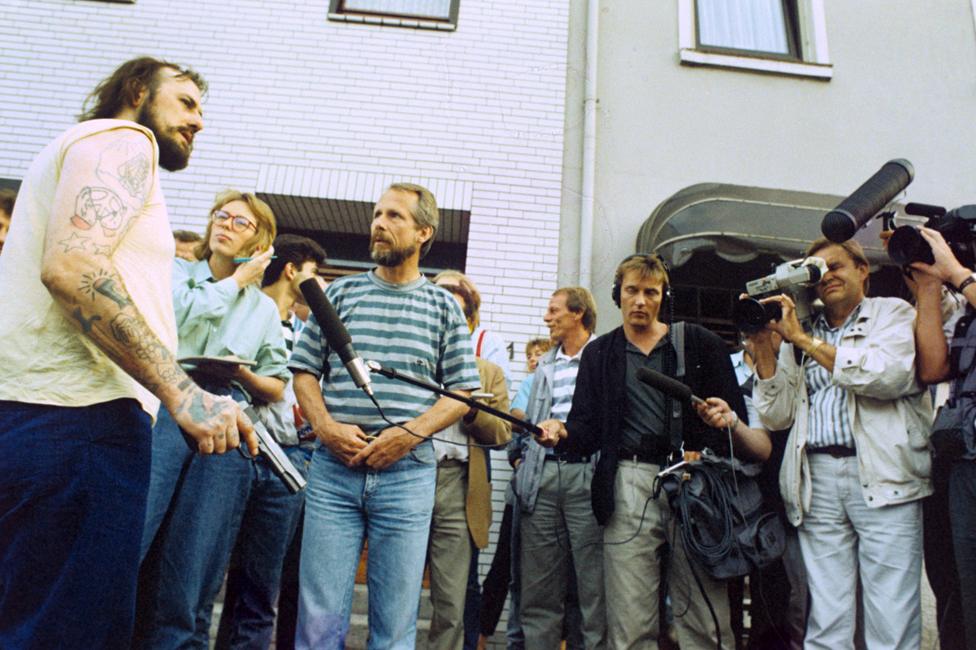
Hans-Jürgen Rösner talking to the media in Bremen
Eventually the bus pulled out, heading towards Hamburg. It then stopped at an autobahn service station, where the two hostages from the bank were released and Rösner's girlfriend, Marion Löblich, went to the toilet.
Here a frustrated police force made a fatal misjudgement. They seized Löblich as she left the toilet. Degowski, realising that she'd failed to return, issued an ultimatum: bring her back in the next five minutes, or he would shoot a hostage. The police missed the deadline and Degowski shot 15-year-old Emanuele di Giorgi in the head. He bled to death.
The bus set off again and during the early hours of the morning crossed the border into the Netherlands.
There the fugitives abandoned the bus and transferred to a car - a BMW provided by the German police. They took two of the passengers with them, 18-year-olds Silke Bischoff and her friend Ines Voitle. At just after 07:00 they crossed back into West Germany.
Millions of television viewers across Germany had been watching with bated breath. It had been compelling theatre, one of the most unforgettable moments coming in Bremen, where the garishly tattooed Rösner told the gathered media he was prepared to end it all, and put the barrel of his gun in his mouth.
But one man had missed all the excitement.
"I'd had a couple of days off and hadn't been watching television or listening to the radio, so I had no idea what had been going on," says the journalist, Udo Röbel.
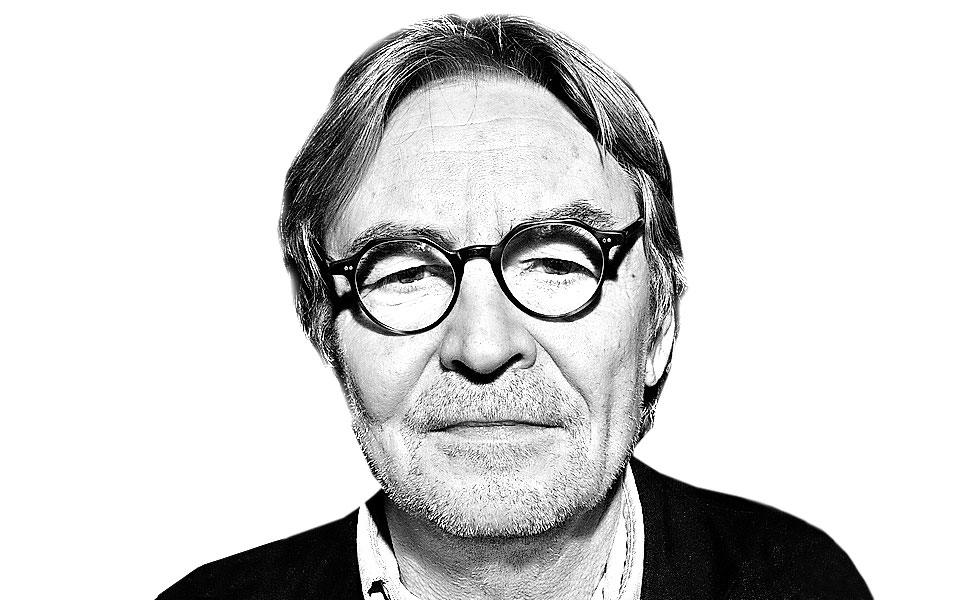
Udo Röbel today
It was only when he walked into the cafeteria at his tennis club that morning that he saw the news on television.
"I drove straight in to work," he says. "I knew I wouldn't have to worry about a headline that day."
What he didn't know was that he was about to become part of the story.
Shortly after Röbel arrived at his office a colleague brought the startling news that the BMW, last heard of crossing the Dutch border, was now parked just outside in the pedestrian shopping area in the centre of Cologne.
Röbel ran downstairs. Sure enough, there was the car, in the middle of the street. Inside were five exhausted people close to breaking point: in the driving seat, Hans-Juergen Rösner, gun in hand; beside him, Marion Löblich; in the back seat Ines Voitle and Silke Bischoff, Dieter Degowski between them. He too was holding a gun.
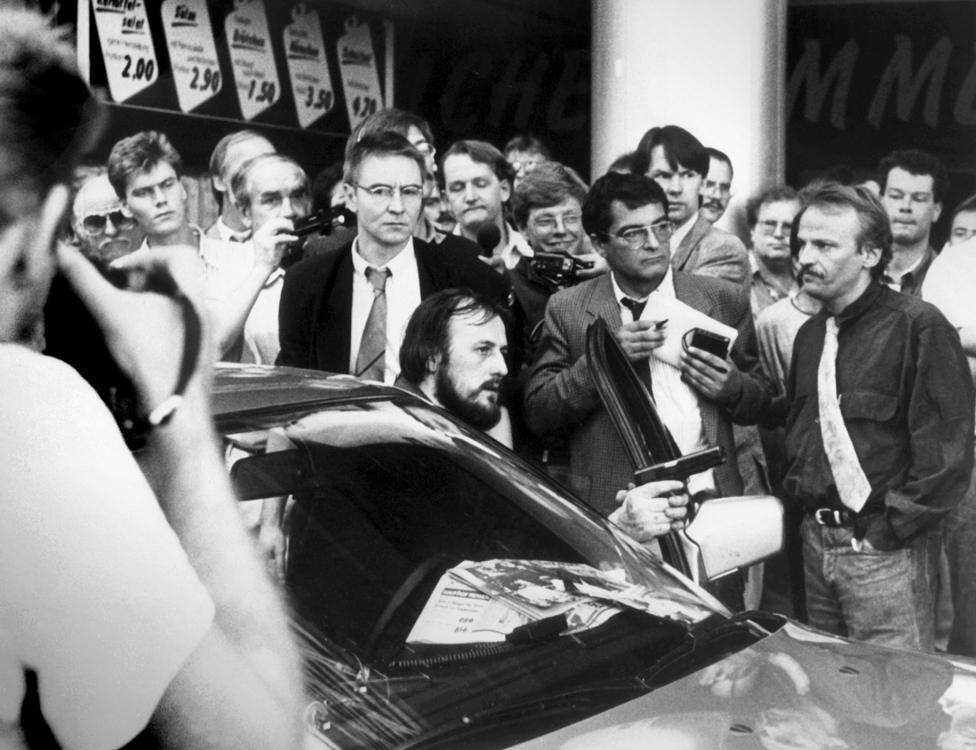
Udo Röbel stands just behind the gun-wielding Hans-Juergen Rösner, wearing a dark jacket and tie
There is a wealth of macabre television footage of this scene.
Dozens of journalists and onlookers press up against the car. They poke their microphones and cameras through the open windows. Silke Bischoff, a gun pressed to her neck, answers a reporter's questions with a weak smile. Degowski, clearly showing the effects of the beer and amphetamines that have kept him going, boasts that he's already killed someone. Rösner repeats his mantra that they're not going to give themselves up.
A photographer arrives and calmly sets up a stepladder to create an angle for her shot.
And there's footage of a TV reporter preparing his interview and noticing that Degowski has his gun in his lap. "Should we have the pistol at her head?" he asks his cameraman. All ethical boundaries have evaporated.
One figure has pushed himself right to the front and appears to have established some kind of rapport with the kidnappers. He's in his 30s, with short hair and glasses. The sleeves of his dark jacket are rolled up to the elbows. He's agitated, waving his arms, remonstrating with the onlookers, pushing them back from the car.
This is Udo Röbel.
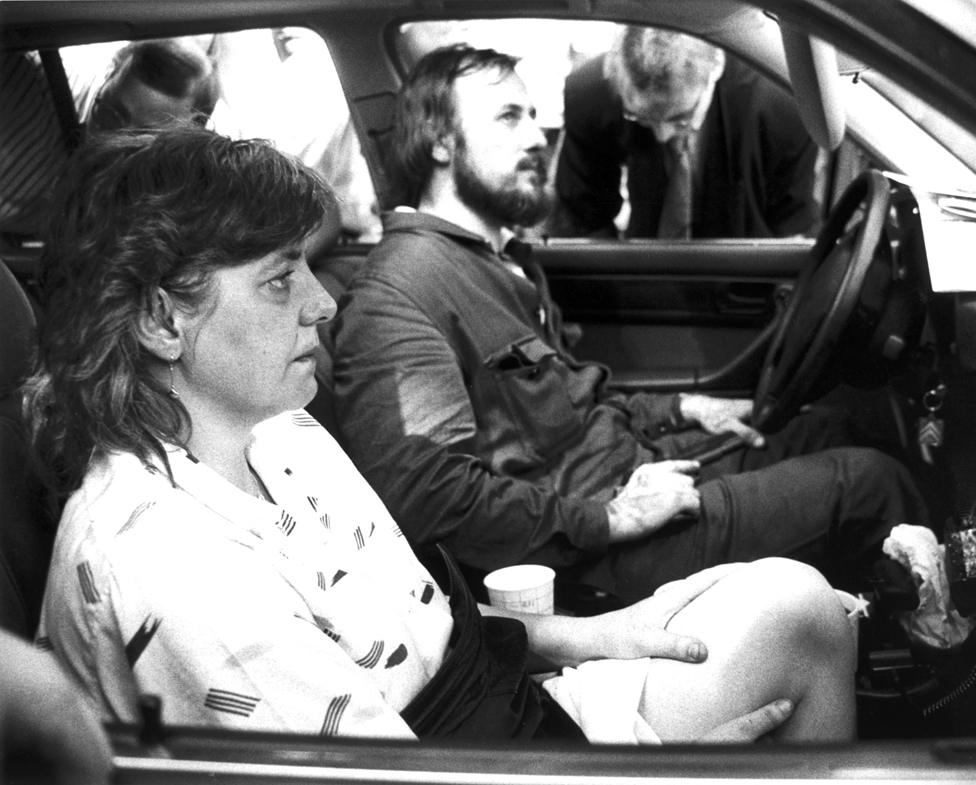
Marion Löblich and Hans-Juergen Rösner, with Udo Röbel taking notes outside the driver's window
Rösner and Degowski had begun to unravel mentally, he says. "I could see how dangerous the situation had become."
It's clear from the footage that Rösner does indeed become anxious. He gets out of the car and with both hands points his gun into the crowd.
"Then he asked me what the quickest way to the autobahn was," Röbel says. "He said, 'We've got to get out of here now. My buddy is about to lose it completely.'''
Röbel began to describe the route but Rösner was impatient.
"He said, 'Why don't you get in and show us the way?'"
This put Röbel on the spot.
"That was the moment that I had to make a decision," he says.
"I had the feeling that I had been given responsibility for a situation which was becoming less and less controllable. But I also had that reporter's instinct that says, 'I want this story. This is mine.'"
So he climbed into the back of the car, next to Silke Bischoff, and it pulled slowly away through the crowd.
"I've thought about this for years," he says.
"I've asked myself if I was the reporter from Hell, or simply a human being, trying to de-escalate the situation and trying to help the two girls. And that's a difficult question to answer, but once I'd taken responsibility for the situation, I suppose I was both. I was simultaneously the guy who was trying to calm things down and the adrenaline-filled reporter on the story of a lifetime."
He tried to start a conversation.
"I assumed that the car was bugged and so I was trying to get them to say something that might be of use to the police," he says. "But then Degowski pointed his gun at me and told me to shut my mouth. So I realised it was better to say nothing."

Silke Bischoff
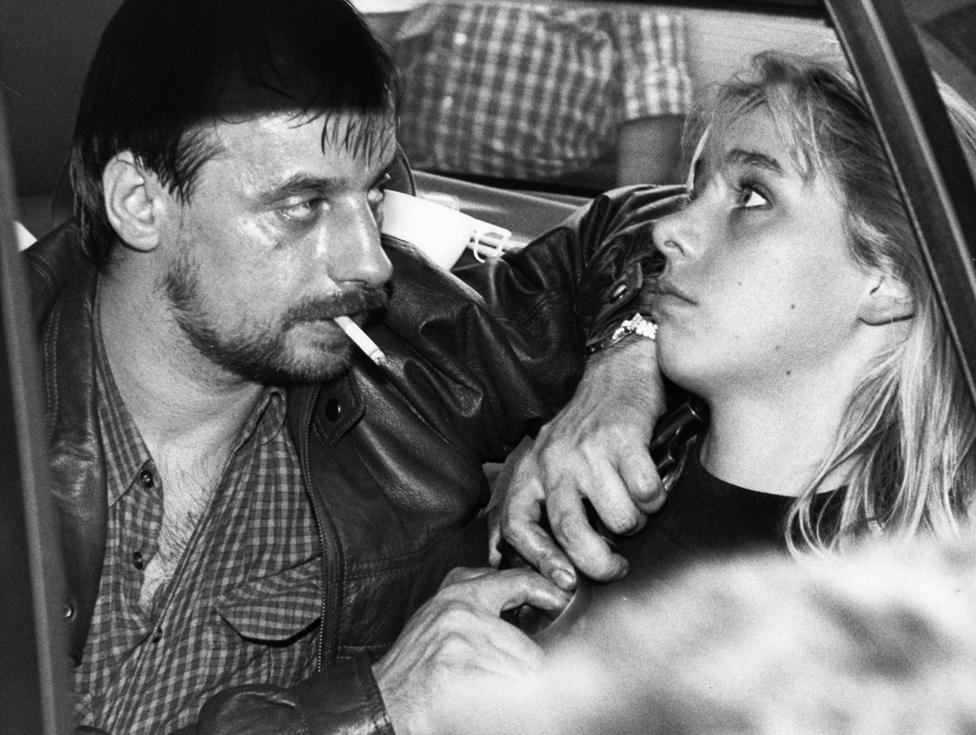
Silke Bischoff was a trainee in a lawyer's office in Bremen. She finished work that day an hour earlier than her friend Ines Voitle and waited for her so they could take the bus home together.
Silke's mother, Karin, spoke about her feelings earlier this year in an interview with the news magazine, Der Stern - and about the image of her daughter with a gun to her head.
"Silke was brave. Very brave," she said. "I wouldn't have coped in the way she did. At the beginning I used to have nightmares because of that picture. I can handle it today. It's still painful, but I don't have to look away now."

Röbel was in the car for around 40 minutes, until they reached a service station on the autobahn. He watched as the BMW drove off. A television crew arrived and interviewed him. "That's when I suddenly went weak at the knees. I realised what I'd done. I realised that I could now easily be dead," he says.
The drama came to a sudden and violent conclusion a few kilometres further down the autobahn, 54 hours after it had begun.
Finally given the command to strike, the police ambushed the BMW, ramming it from the side. A gun battle ensued. Pictures show Rösner and Degowski, once the dust had settled, handcuffed, noses to the tarmac. Marion Löblich was also captured. Ines Voitle had scrambled to safety in a ditch beside the road.
But nothing could be done for Silke Bischoff. She'd taken a bullet in the chest from Rösner's gun and died at the scene.
Udo Röbel heard the news at a local police station.
"It was a shock," he says. "I'd been sitting next to her only a few minutes earlier."
Back in his office he sat down to write a remarkable eyewitness story.
"If there's one thing for which I do reproach myself, then it's this: that I tried to write the story of the last minutes of Silke Bischoff's life, that I drove this media voyeurism right to the very end," he says. "I'm still ashamed that I squeezed the very last drops out of the story."
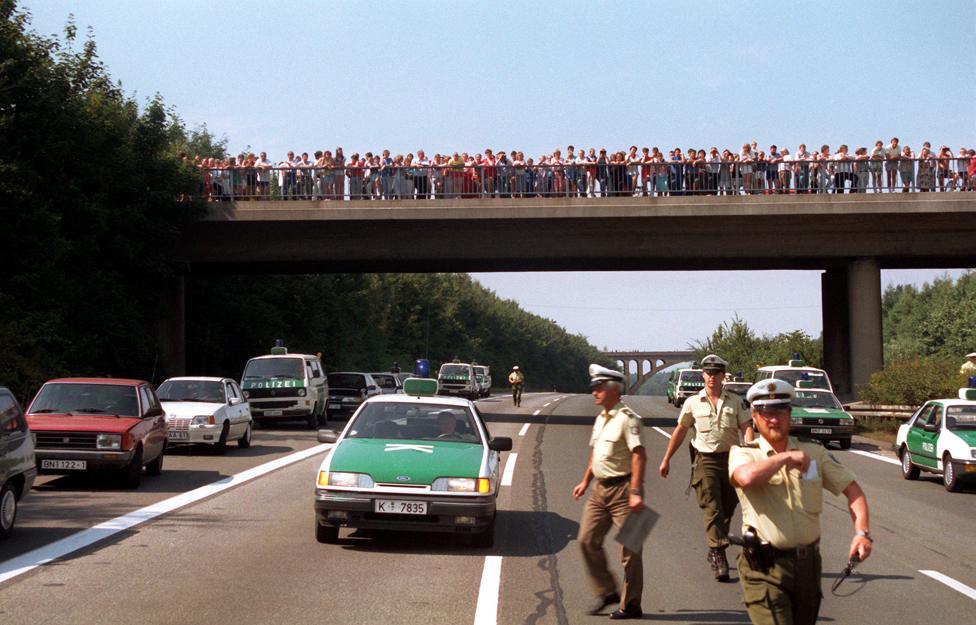
Crowds gathered on a bridge over the autobahn in the aftermath of the shootout
Several years later, Röbel says, he was invited to take part in a public discussion at a local police academy. Also present was the judge who had sentenced Rösner and Degowski to life in prison.
"At one point I said that reporters had crossed the line and that that should never happen again," says Röbel.
"And then the judge turned to me and he said, 'It seems to me, Herr Röbel, that you prevented a bloodbath that day in Cologne. If you hadn't got into the car and the gangsters hadn't been able to drive away, the whole situation would have run out of control.' And that, for me, was like absolution."
Not everyone took such a charitable view. The official report into the whole event produced by a parliamentary enquiry in the state of North Rhine Westphalia commented drily on journalistic ethics.
"The chances seem slim in the foreseeable future that there will be a change of awareness, when it is accepted that, for example, the journalist who actively helps the perpetrators and who makes the job of the police significantly harder is then recruited by a rival newspaper on better remuneration, with clear reference to his 'clever' behaviour."
The following year Udo Röbel was offered a job by one of Germany's biggest tabloids, Bild am Sonntag. He later became editor-in-chief of its sister paper, Bild.
As a result of Gladbeck the German Press Council rewrote its guidelines to make explicit that it was not permissible for journalists to interview perpetrators while a crime was in progress.
Dieter Degowski now lives in anonymity - he was given a new identity when he left prison. Marion Löblich received a nine-year sentence, of which she served six. Hans-Jürgen Rösner has yet to be released.

You may also like:
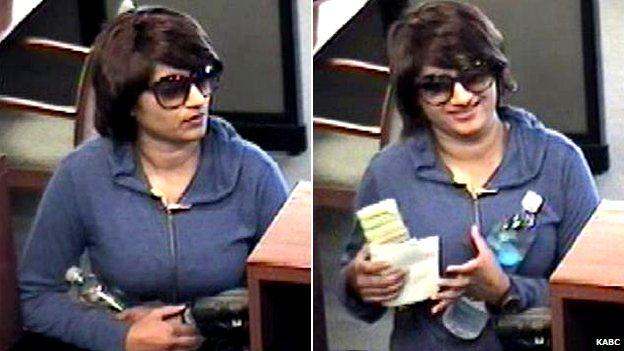
For two months in the summer of 2014 an unusual bank robber shocked, mystified and captivated the US. She was a woman, she was short, young and well-dressed, and she held up a string of banks in quick succession. The Bombshell Bandit told Jeff Maysh her story.
Read: The rise and fall of the bombshell bandit
Join the conversation - find us on Facebook, external, Instagram, external, YouTube, external and Twitter, external.
